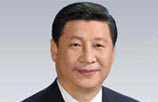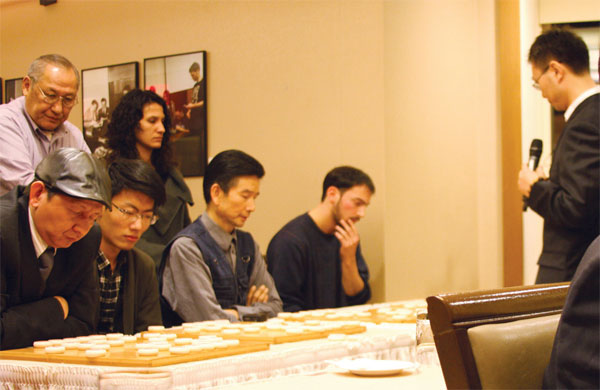Chinese chess captivates fans
Updated: 2014-12-16 11:50
By Jack Freifelder in New York(China Daily USA)
|
||||||||
|
Xiangqi master Dang Fei (right, seated), the world record holder for simultaneous blindfold xiangqi matches, takes part in a series of "blindfold matches" on Monday during a demonstration at Columbia University in New York. Jack Freifelder / China Daily |
Two chess experts from China are in New York this week to spread the game of traditional Chinese chess, or xiangqi, to the rest of the world, and the duo hope to find a following for the 2,000-year-old game.
"For thousands of years, xiangqi has had fans in China and worldwide because of its unique and amazing charm," xiangqi master Dang Fei said through a translator on Monday. "People meet through xiangqi and find friends with common interests, so the game has become a bridge for broader exchange.
"Xianqi reflects Chinese culture, and in turn, Chinese people's wisdom," Dang said.
Xie Jun, the vice-president of Capital University of Physical Education and Sports in Beijing, said: "In xiangqi you need to use strategy and you need to be smart because it's thinking and problem-solving. The rules are easy to learn, but hard to master."
Xie, who is also a chess grandmaster, said there are many people playing xiangqi in China, including celebrities like basketball player Stephon Marbury of the Chinese Basketball Association's Beijing Ducks.
Dang and Xie made their comments on Monday during an open demonstration on the game, at Columbia University. Representatives from the Chinese and New York Xiangqi Associations joined the two players. The Sino-American Cultural Council sponsored the event, attended by nearly 50 people
The show featured a lecture on the cultural and historical significance of xiangqi, a tutorial on the pieces and rules, and an exhibition match with Dang, a world record-holder for simultaneous blindfold-xiangqi matches.
Blindfold xiangqi is another term for a match in which the player cannot see or touch his or her pieces.
Xiangqi was recognized as an official Chinese sport in 1956, and the Chinese Xiangqi Association, a nongovernmental organization based in Beijing, was set up six years later. The Chinese organization was accepted into the International Xiangqi Federation in 1975, and would become one of the founding members of the Asian Xiangqi Federation in 1978.
Although xiangqi originated in China, there are many xiangqi leagues and clubs around the world, including in North America. More than 20 countries have joined the World Xiangqi Federation since its inception in the 1990s, a group that includes: Canada, France, Germany, the United Kingdom and the US.
"Xiangqi is an outstanding cultural product of China," Liu Si Ming, president of the Chinese Xiangqi Association, said in a statement. "It is steeped in Chinese culture and embodies the heritage of Chinese wisdom. Just like Peking Opera and Chinese calligraphy, xiangqi is the quintessence of China."
Xie, the chess grandmaster, said she hoped the chance for people to see xiangqi up close would pique their interest.
Chinese people play xiangqi on their phones, computers, on the Internet, or even in life-sized games, and all of that attention goes toward advancing the game domestically and abroad, she said.
Dang said the historical status of the game is recognized, but "the spread of xiangqi culture still has a long way to go".
"Xiangqi is like life," Dang said. "The attitude of the players determines the outcome of the game, and life is no different. It's surprising, but profound enlightenment can be found on a small chessboard."
jackfreifelder@chinadailyusa.com

 China has harsh words for deadly Taliban attack
China has harsh words for deadly Taliban attack
 New flight links SF with Wuhan, Guangzhou
New flight links SF with Wuhan, Guangzhou
 10 English-language apps to get around and about in China
10 English-language apps to get around and about in China
 Happy Christmas market
Happy Christmas market
 Top 10 secrets inside Xiaomi's marketing
Top 10 secrets inside Xiaomi's marketing
 Old fashioned tea house seen in Anhui
Old fashioned tea house seen in Anhui
 Yearender: Chinese actresses who married in 2014
Yearender: Chinese actresses who married in 2014
 Ground broken in NYC
Ground broken in NYC
Most Viewed
Editor's Picks

|

|

|

|

|

|
Today's Top News
New flight links SF with Wuhan, Guangzhou
Sino-US pact seeing major progress: Zhu
China trims US stake to 2-yr low
Solar panel fines could have ripple effect: experts
China has harsh words for deadly Taliban attack
Greenland Group starts NY housing project
Graft watchdog steps up SOE investigations
China's ex-PM donates $6m to foundation
US Weekly

|

|








